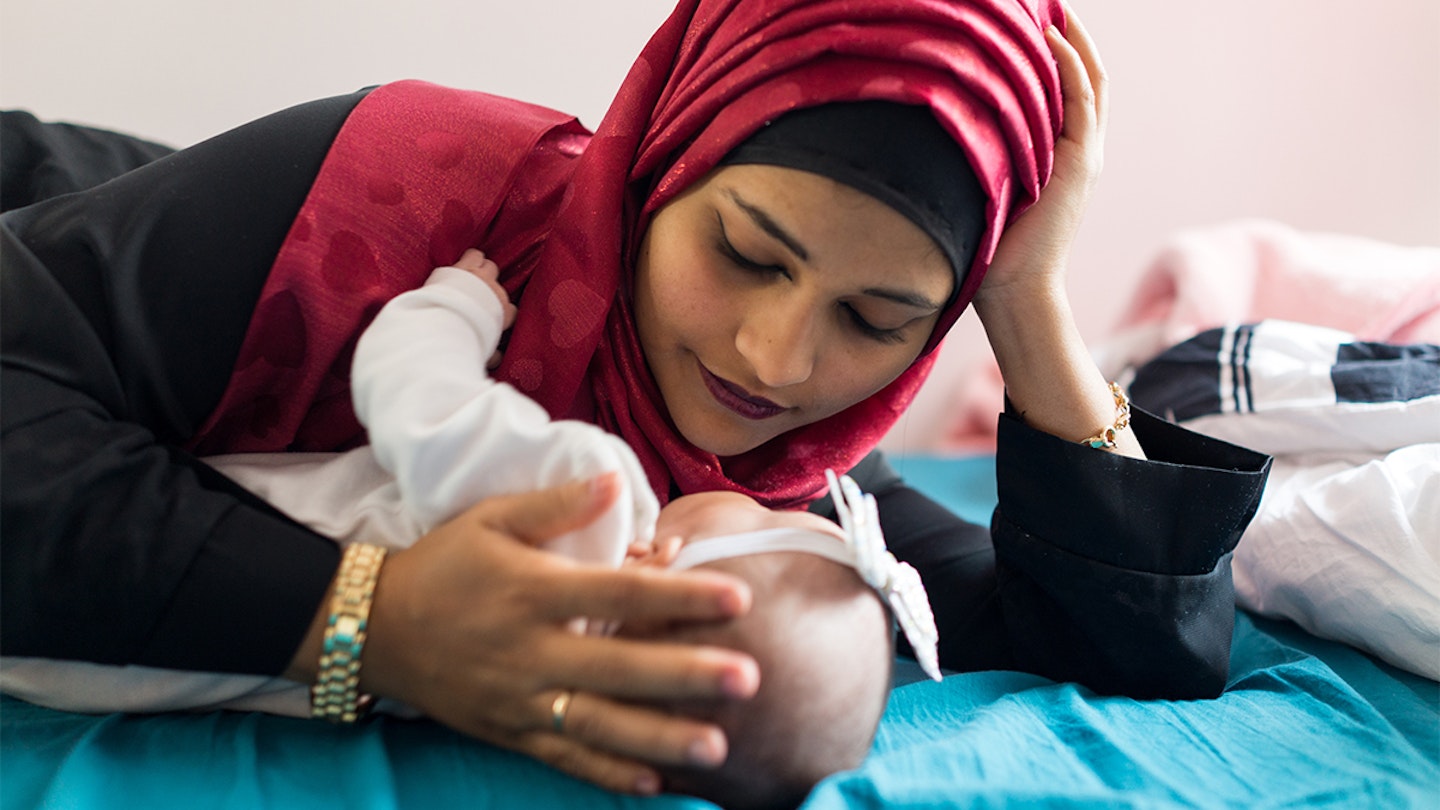As Ramadan begins, many will have been preparing mentally and physically for long hours of fasting and prayer. But what if you're pregnant or have just given birth? Is it safe to fast during pregnancy? And what if you're breastfeeding?
Parenting during Ramadan comes with additional challenges for new parents and those who are pregnant or breastfeeding. It's no secret that being pregnant can make you more tired than normal, and the early months of a new baby are likely to be sleep-deprived. But if you're fasting during pregnancy or parenting, that tiredness is only going to be harder. So, what can pregnant women and new parents do to make the most of Ramadan while nurturing themselves and their baby?
The first thing to note is that pregnant and breastfeeding women don't have to fast. As the NHS explains, "broken fasts or missed fasts can be made up at any other time outside Ramadan, before the arrival of the next Ramadan. Alternatively, a fixed sum of money can be given to charity; this is known as ‘Fidya’." So while it might feel as though you're missing out if you're not fasting in Ramadan due to pregnancy, there are ways you can make up for it.
We've spoken to Dr Anna Sanniti, registered nutritional therapist and nutritional advisor, and Dima Al-Sayed, registered dietician, to find out all you need to know about fasting during pregnancy and breastfeeding, and how to fast safely.
Tips for fasting parents
If you've recently had a baby or have small children, there are some tips that can make it easier.
Take naps – since the nights are so short in Ramadan and you’re also trying to feed your baby through the night, naps will help keep you energised and give you the rest you need.
Eat when you can - While it might be tempting to sleep in, make sure you don't miss Suhoor (the pre-dawn meal). Your body will need as many nutrients and calories as you can get to get you through the day.
Activities – Preparing Ramadan activities for kids can be a great way to keep them excited and occupied. You could spend some time reading books to teach your children about Ramadan so they can learn more about this holy month.
Get outside – try to take a walk with your little one(s) every morning, this will help you get some air, refresh your mind and also enjoy nature.
Be prepared - Batch cook recipes are a saviour in Ramadan. Not only do they help you plan for your day, but it's far more efficient making a recipe in bulk. Also have your fridge and kitchen cupboards stocked up. You could also opt for a food delivery rather than having to rush out to the supermarket.
Don’t over-exert yourself – don’t try to clean the whole house or run errands - you need all of your energy to fast and take care of your children. Pace yourself, and don’t be afraid to ask for help.

Breastfeeding and fasting in Ramadan: Is it possible?
Suppose you're wondering if you can fast in Ramadan while breastfeeding, listen to your body. Pregnant women, or those who are breastfeeding, are not obliged to fast during Ramadan, although some may still choose to do so. As mentioned above, if you feel unable to fast for Ramadan while breastfeeding, your fast can be done later in the year instead.
If you do want to fast during Ramadan while breastfeeding, check with your GP first. You can also seek religious consultation if you feel unable to fast and breastfeed.
Tips for fasting while breastfeeding
• Drink plenty when you break your fast, but not so much that you have no room for food - getting enough calories is important too.
• Do not skip Suhoor (the pre-dawn meal) as your body will need to store as many nutrients as it can, set an alarm clock if needs be.
• If you begin to notice signs of dehydration (headaches, thirst, dizziness, or faintness), break your fast with water, ideally with some sugar and salt added, to rehydrate you quickly.
• Be willing to break your fast if you are feeling unwell.
Is it safe to fast during pregnancy?
Dima Al-Sayed, Registered Dietitian, says, “My advice as a nutritionist is to ask yourself. No one knows your body like you. Some pregnancies are easier than others, and it can also depend on the hours that you’re fasting.” Dr Anna Sanniti agrees, "The answer is different for every pregnant person or breastfeeding mother, depending on the person, their baby's age, and where they live. I would recommend that the pregnant or breastfeeding woman talk to their doctor before deciding to fast. Breastfeeding can be very depleting for the mother, so fasting may not be advisable."
Dr Sanniti also suggests paying attention to how fasting affects your energy levels, body, and milk production if you're breastfeeding. "It would be advisable to keep monitoring how fasting is making the person feel, and whether fasting is affecting milk production too, as you would not want to impact the baby's nutrition."
Nutritious and healthy snacks for Ramadan
If you're pregnant, breastfeeding or a parent, remember to take care of your own physical health, whether you are fasting or not. This can be quite tricky, especially if everybody else is fasting, but your body and your baby have the same demands whether in Ramadan or not. It is a good idea to stock up on your favourite healthy snacks and the best food to eat during pregnancy, including:
• Fresh or dried fruit
• Nuts
• Yoghurt - adding oats or chia seeds is a great way to add nutrients
• Dates
Dr Sanniti notes that "in terms of keeping energy levels up, fasting pregnant women and breastfeeding mothers should ensure that they keep well hydrated, as well as making sure that they are eating enough protein (such as eggs, fish, legumes, and meats), and healthy fats (such as olive oil, nuts, seeds, avocado) along with whole food carbohydrates (grains, vegetables and fruits) with each meal. Also, ensuring that the meals contain a good source of iron (meat, leafy greens, legumes)."
Try to avoid fried foods, sugar, and unbalanced meals (i.e. containing too many carbs). A balanced diet is the way to go. Keep a food diary to keep track of what you are eating and drinking overnight, so you can make sure that you are getting a good balance of healthy, nutritious foods.
Finally, listen to your body. Nourish it with the best foods possible when you can, stay hydrated, and rest when you can. And above all, remember that parenting is an ibadah (act of worship) in itself. So, if you feel like you haven’t had a chance to pray or connect with God as much, you are already carrying out an act of worship by parenting.
About the expert
Dr Anna Sanniti, nutritional adviser to Wiley's Finest, is a Registered Nutritional Therapy Practitioner rCNHC mBANT with a PhD in Clinical Medicine and Genetics. Anna has a special interest in women’s health, fertility, pregnancy, and autoimmune diseases. She runs a private practice online, or in person in clinic spaces in Sussex.
About the author
Lorna White is the Products Editor for Mother&Baby. After running the Yours magazine website, specialising in content about caring for kids and grandchildren, Lorna brought her expertise to Mother&Baby in 2020. She has a keen interest in a range of topics from potty training and nutrition to baby names and early development and has a wide range of experienced medical experts and professionals at her fingertips. In her spare time, she enjoys spending time with her two young sisters, dog walking and enjoying the outdoors with her family.
